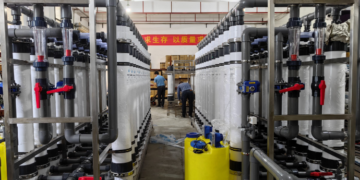In the fast-paced world of mobility, where innovation and sustainability have become the cornerstones of progress, the global automotive revolution is gaining traction like never before. Behind the success of this transformation lies a robust and often underappreciated sector — auto components manufacturing companies in India.
From precision engineering and cost-effective production to advanced materials and smart manufacturing, Indian manufacturers are redefining industry benchmarks. With the rise of electric vehicles (EVs), autonomous technologies, and global supply chain shifts, India is emerging as a strategic hub in the global auto component ecosystem.
The Rise of India as a Global Auto Component Powerhouse
India’s journey in the automotive sector started modestly but has grown exponentially over the last few decades. Today, India is the third-largest automobile market in the world and boasts one of the most dynamic auto component industries globally.
Auto components manufacturing companies in India contribute significantly to this growth story, backed by government initiatives like Make in India, PLI (Production-Linked Incentives), and a strong focus on Atmanirbhar Bharat (self-reliant India).
As of FY2024, the Indian auto components industry reached a market size of over USD 70 billion, with exports contributing a significant chunk of this figure. Indian manufacturers serve clients in North America, Europe, Africa, and Southeast Asia, positioning themselves as indispensable partners in the global supply chain.
Key Drivers Behind India’s Success in Auto Components Manufacturing
1. Cost-Effective and High-Quality Manufacturing
India offers the unique advantage of high-quality engineering at competitive costs. This has enabled Indian component manufacturers to deliver global standards while remaining cost-effective. Companies utilize cutting-edge technologies like CNC machining, composite molding, 3D printing, and digital twin simulations to enhance precision and consistency.
2. Technological Advancements and R&D Focus
With increased investments in research and development, Indian manufacturers are now leading the charge in advanced technologies such as:
- Lightweight composites for enhanced fuel efficiency
- Telematics integration for connected vehicles
- EV components including battery casings, BMS, and charging systems
- Carbon fiber and hybrid components for motorsports and luxury vehicles
Rockman Advanced Composites, for instance, has been instrumental in pushing the envelope with innovative carbon composite parts that reduce weight while enhancing performance.
3. Skilled Workforce and Engineering Talent
India has a rich talent pool of engineers and technicians, many of whom are trained in automotive-specific disciplines. Institutes like IITs, NITs, and various polytechnics produce graduates who bring fresh innovation to the shop floor and R&D centers.
4. Robust Supply Chain and Infrastructure
From Tier-1 suppliers to MSMEs, India has built a resilient supply chain ecosystem that supports the rapid prototyping, testing, and mass production of auto components. Coupled with dedicated industrial corridors, ports, and logistics infrastructure, Indian companies ensure on-time delivery for global OEMs.
Segment-Wise Excellence: Where India Stands Tall
Auto components manufacturing companies in India serve a wide spectrum of the automotive industry. Here’s a look at their capabilities across different segments:
1. Engine Components
From cylinder heads and crankshafts to pistons and camshafts, Indian manufacturers produce high-precision engine components that comply with Euro VI and BS6 norms.
2. Transmission and Driveline Systems
India is a preferred source for gearboxes, clutch assemblies, axles, and CV joints. With increasing demand for automatic and dual-clutch systems, companies are expanding into sophisticated transmission modules.
3. Suspension and Braking Systems
Indian suppliers offer advanced braking systems (including ABS and EBS), suspension struts, and leaf springs, catering to both commercial and passenger vehicles.
4. Interior and Exterior Components
From dashboards and infotainment consoles to door trims and bumpers, design-led manufacturing ensures ergonomic and aesthetic excellence.
5. Electrical and Electronics
With the EV boom, companies are ramping up production of wiring harnesses, sensors, ECUs, and power electronics, crucial for intelligent vehicles.
The EV Wave: A New Growth Engine
The global shift towards electrification is accelerating, and auto components manufacturing companies in India are at the forefront of this change. Here’s how they’re contributing:
Battery Pack Housings
Utilizing aluminum and composite materials to manufacture lightweight, thermally efficient casings.
Electric Drive Units (EDUs)
Indian companies are producing gearboxes and inverters for EV applications, ensuring compact and efficient performance.
Thermal Management Systems
Cooling solutions are essential for EV batteries and motors, and Indian firms are innovating in this space through smart heat-exchanger designs.
Charging Infrastructure Components
Manufacturers are also expanding into ancillary infrastructure, including connectors, relays, and onboard chargers.
Sustainability and Green Manufacturing
Auto components manufacturing companies in India are also embracing sustainability with open arms. Many have adopted:
- Zero Liquid Discharge (ZLD) processes
- Green energy integration (solar and wind)
- Waste recycling and circular economy principles
- Environment-friendly materials like recycled thermoplastics and bio-composites
This green shift not only appeals to eco-conscious global clients but also aligns with long-term ESG goals.
Case Study: Rockman Advanced Composites
A shining example of innovation and excellence is Rockman Advanced Composites, a division of the Hero Group. Specializing in carbon fiber components, Rockman addresses the growing demand for lightweight, high-performance parts across automotive, motorsports, aerospace, and defense.
Their capabilities include:
- High-pressure autoclave molding
- Resin Transfer Molding (RTM)
- Tooling and prototyping for complex geometries
- End-to-end design-to-delivery services
Serving prestigious clients across Europe and Asia, Rockman’s contributions demonstrate how Indian companies are setting global benchmarks.
Challenges and the Road Ahead
While the prospects are promising, Indian manufacturers must also navigate several challenges:
Supply Chain Volatility
Raw material prices and global logistics disruptions can affect operations. Companies are now looking at localized sourcing and backward integration.
Technological Catch-Up
Keeping pace with fast-evolving technologies in AI, IoT, and autonomous vehicles requires consistent investment in upskilling and R&D.
Policy and Regulatory Dynamics
Adapting to diverse global compliance standards (Euro norms, US FMVSS, etc.) is crucial for export success.
Yet, despite these challenges, the industry’s resilience and adaptability remain strong. With a CAGR of over 10%, the Indian auto components sector is expected to reach USD 200 billion by 2030, making it one of the fastest-growing segments in global manufacturing.
Conclusion
As the global automotive revolution continues to evolve, auto components manufacturing companies in India are not just keeping pace — they’re leading the charge. With a fine balance of affordability, innovation, quality, and sustainability, India is emerging as the global epicenter of auto component excellence.
For OEMs and Tier-1 suppliers looking to future-proof their supply chains, India offers an unmatched value proposition — one that combines world-class engineering with deep-rooted manufacturing expertise.
In short, if the vehicles of tomorrow are to be smarter, greener, and faster, India’s auto component manufacturers will be the unsung heroes powering their journey.



























